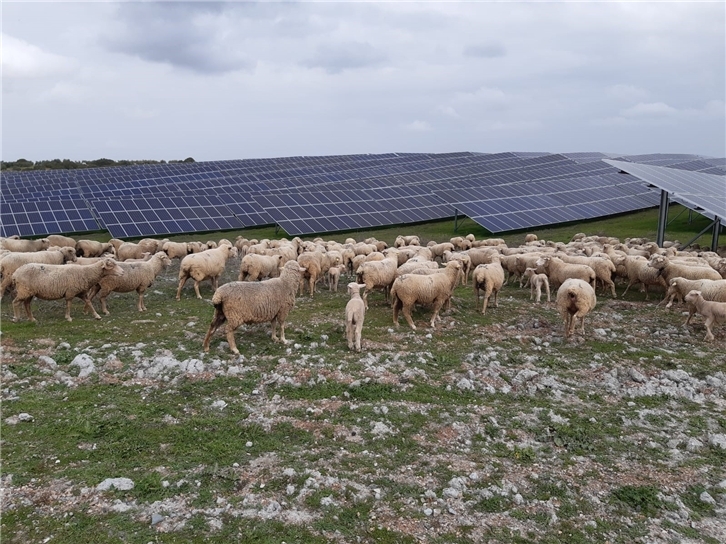News
-
28/05/2021"Opportunities of the green economy" The chairman of Iberdrola group, Ignacio Galán, reviews in an article published in Expansión about the opportunities presented by the green economy for a change of model. "2021 is a decisive year for transforming the Recovery Plans and developing structural reforms as levers of a change that will breathe new life into our economy", he writes. Galán said that, although the company has been taking firm steps for years, in recent years, the European Union has cemented its leadership in climate change, backed by regulatory changes that will achieve climate neutrality by 2050. And it has taken things further, orienting the Recovery Plan and its resources toward two specific areas: Decarbonisation — in 2030, Europe should have reduced its emissions by 55 % compared to 1990 — and the digital transformation. The chairman of Iberdrola also underlines that the United States “is also firmly committed to being green, undertaking to reduce its emissions by up to 52% for 2030, with respect to 2005, which will demand a carbon-free energy mix by 2035”. And other leading economies, like United Kingdom and Japan are moving in the same direction, with ambitious objectives that require a new production model. These four economies, as you will remember, account for around 27 % of global greenhouse gas emissions. "With governments in the main economies working in the same direction, pressure from markets and investors and citizen demand for more awareness and activism, companies have no option but to strengthen their strategies and measures to speed up the transformation", said Galán. Galán summarised Iberdrola's strategy, which started out on this road decades ago, leading an energy transition in which it has invested €120 bn and driving a value chain made up of more than 22,000 suppliers, providing jobs for more than 400,000 people. "Thanks to the vision and committment of the last 20 years, our emissions are already three times lower than our competitors'. Read the whole article in Expansión (page 168) . READ MORE

-
26/05/2021Iberdrola installs the first battery in a renewable project in Spain, the Arañuelo photovoltaic plant Iberdrola is making progress with innovations in renewables with the objective of optimising energy use and promoting efficient integration of renewable energies in the electricity network. The energy company has installed the first battery in a photovoltaic facility in Spain, the Arañuelo III (40 MW) solar farm, currently under construction in the town of Romangordo (Cáceres, Extremadura). The project has a 3 MW battery and 9 Mwh of storage capacity. Ingeteam is the company hired for its development. In Spain, as well as Arañuelo III, it is carrying out the Puertollano project (Ciudad Real), currently the first and largest green hydrogen plant in Europe, powered by a 100 MW photovoltaic facility that includes Li-ion batteries with 20 MWh of storage capacity. On the Elgea-Urkilla (32 MW) wind farm in Álava, Basque Country, the battery has an installed power of 5 MW and 5 MWh of storage capacity and will be the first installed in a wind farm in Spain. There are plans to build another at the ST Abadiano in Biscayne, Basque country, with 6 MW, which will also be built by Ingeteam. In the Canary Islands, Iberdrola will install batteries on the Ifara and El Vallito wind farms in Granadilla de Abona, Tenerife, with a 12 MW storage system. The company is building or has permission to build 200 MW of battery power, some of which has already been installed, which will increase to 300 MW by 2025, mainly in UK markets and Australia. The company's current battery storage project portfolio has already reached 900 MW. A key component of the energy transition Storage systems are key to addressing the challenges of the energy transition and are set to become an essential element in the electrical system of the future. This is because they allow the quality of the electricity supply to be improved, ensuring the stability and reliability of the network and integrating and harnessing the energy generated by renewable sources. The company is still firmly committed to storage with pumping technology, with a leading position and more than 4,000 MW installed in projects like Cortes-La Muela (Valencia) - the largest facility of its kind in Europe - and Tâmega, under construction in Portugal. In November 2019, Iberdrola commissioned the first energy storage system with Li-ion batteries for distribution networks in Spain. The project, which is the first in the country, is located in the Murcian municipal district of Caravaca de la Cruz, will improve the quality of the energy supply in the surrounding area, as well as the use of solar energy generated in the area. Iberdrola is certain that the energy transition can be a driving force in the transformation of the industrial sector and for a green recovery in the economy and the job market. To achieve this, the company has launched an unprecedented investment plan worth €75 bn for the 2020-2025 period, which will be €150 bn by 2030, with the aim of doubling its renewable capacity and taking advantage of the opportunities presented by the energy revolution facing the world's main economies. Investments in Spain for the period amount to around €14.3 billion, half of which will be spent on developing renewable energy projects, while more than 4.5 billion will go towards strengthening and digitalising its electricity grids. READ MORE
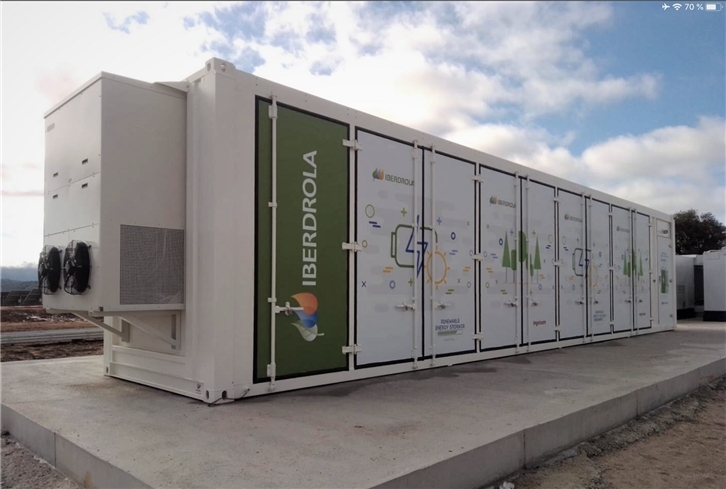
-
26/05/2021Iberdrola will install the first battery in a wind power project at the Elgea-Urkilla wind farm in the Basque Country Iberdrola is moving forward with innovative renewable energy projects, with the aim of maximising energy use and continuing to promote the efficient integration of renewable energies into the electricity grid. The energy company will build on the 32-MW Elgea-Urkilla wind farm in Araba, Basque Country, the first battery storage system to be installed on a wind farm in the country, it will have an installed capacity of 5 MW and a storage capacity of 5 MWh. It has also planned another at the Abadiño TS (Bizkaia, Basque Country), which evacuates the power generated at the Oiz wind farm, this battery will have a capacity of 6 MW and be installed by Ingeteam. In Spain, the company has installed the first battery in a photovoltaic plant in Spain, Arañuelo III (40 MW), which it is building in the municipality of Romangordo (Cáceres, Extremadura). The project involves a 3-MW battery with a 9 MWh storage capacity and the contract for its development has also been awarded to Ingeteam. It is also developing the Puertollano (Ciudad Real) project - the first and largest green hydrogen plant in Europe at present, powered by a 100 MW photovoltaic plant - which will include a lithium-ion battery system with a storage capacity of 20 MWh. In the Canary Islands, Iberdrola will install batteries at the Ifara and El Vallito wind farms in Granadilla de Abona, Tenerife, which will have a storage capacity of 12 MW. The company has 200 MW of battery power currently under construction or secured, some of which is already installed, this figure will rise to 300 MW by 2025, mainly in the UK and Australian markets. The company's current portfolio of battery storage systems amounts to 900 MW. Key to addressing the energy transition Storage systems are key to addressing the challenges of the energy transition and are destined to become an essential element in the electrical system of the future. This is because they allow the quality of the electricity supply to be improved, ensuring the stability and reliability of the network and integrating and harnessing the energy generated by renewable sources. The company maintains its commitment to energy storage through pumped storage technology, where it is the leader with more than 4,000 MW of installed capacity, in projects such as Cortes-La Muela (Valencia) -the largest installation with these characteristics in Europe- and Tâmega, which is under construction in Portugal. In November 2019, Iberdrola inaugurated the first lithium-ion battery electricity storage system for distribution grids in Spain. The project, a pioneer in the country and located in the municipality of Caravaca de la Cruz (Murcia), improves the quality of energy supply in the surrounding area, as well as making the most of the solar energy generated in the region. Iberdrola is certain that the energy transition can be a driving force in the transformation of the industrial sector and for a green recovery in the economy and the job market. To this end, the company has launched a historic investment plan valued at 75 billion euros for the period 2020-2025 (150 billion by 2030), with the aim of doubling its renewable capacity and taking advantage of the opportunities offered by the energy revolution facing the world's leading economies. Investments in Spain for the period amount to around 14.3 billion euros, half of which will go to developing new renewable projects, while more than 4.5 billion euros will go to strengthening and further digitalising electricity grids. READ MORE
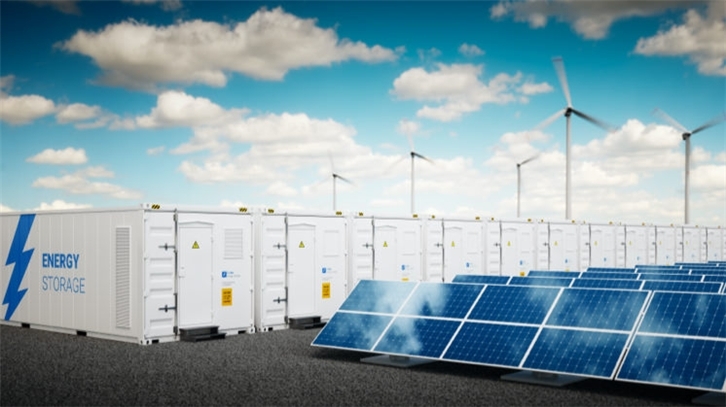
-
26/05/2021Ignacio Galán greets the Spanish Olympic and Paralympic athletes on their way to Tokyo and pledges Iberdrola’s full support for the Games The Chairman of Iberdrola, Ignacio Galán, accompanied by the Ambassador of Japan, Hiramatsu Kenji; the President of the Spanish Olympic Committee, Alejandro Blanco; and the President of the Spanish Paralympic Committee, Miguel Carballeda, welcomed eleven athletes who will represent Spain at the Tokyo 2021 Olympic and Paralympic Games, promising Iberdrola’s full support for this new Olympic adventure. Among the athletes who are on their way to Tokyo and who participated in this meeting were Carolina Marín, gold medallist at the Rio Olympics and three-time world champion; Sandra Sánchez, the best karateka in history with six consecutive European gold medals; the Spanish athlete who has competed in the most Olympic Games (6), Teresa Portela; the promising Spanish handball player and world runner-up, Eli Cesáreo; and the six-time Spanish champion and veteran of the Olympic Games with three participations, Loida Zabala. Also present were Miriam Casillas, triathlete, European runner-up in 2018; Desiré Vila, who has jumped 4.17 metres, will compete in her first Olympic Games; the paratriathlete, Eva Moral, who has already won three medals in the World Series; María Xiao, five-time Spanish table tennis champion; Beatriz Pérez, representing Spanish hockey, returns to the Games after competing in Rio; and Laura García, who won the European team title for the first time in the 20km race walk in athletics. At the event at the company’s headquarters, Ignacio Galán said that “we are committed to promoting a winning combination: sport and women. For years, we have been committed to promoting women’s sport in the belief that we are fighting for equal opportunities”. “The Olympic spirit is the best representation of all the values of sport, which is why, at the start of this new Olympic period, we want to give you all our energy to accompany your successes." “We share values such as effort, self-improvement, professionalism and teamwork. You set an example to numerous men and women, especially girls and boys, and are role models for the 300,000 women athletes who participate in the competitions supported by Iberdrola”, he added. The athletes took part in a ceremony to light the Light of Iberdrola, which will continue to burn at the company’s headquarters during the Olympic Games as a symbol of the company’s commitment to the Olympics, equal opportunities and female empowerment. Iberdrola's support for the female Olympians who will participate in the Tokyo Games between 23 July and 8 August, and in the Paralympic Games between 24 August and 5 September, comes months after the company increased its presence in the Japanese offshore wind market; “A country with which we share a strong support for the energy transition”, explained Iberdrola’s chairman. Support for more than 300,000 female athletes Iberdrola has made real equality between men and women one of its core values. In 2016, it was the first company to make a global commitment to equality and the empowerment of women through sport. The company currently supports 16 federations: gymnastics, triathlon, rugby, canoeing, badminton, football, handball, volleyball, hockey, table tennis, athletics, karate, boxing, surfing, ice sports and fencing. Iberdrola also lends its name to 22 national top-tier sports leagues, and 35 other competitions. At the same time, the provision of resources, facilities, medical services and referees, as well as support and sponsorship for different initiatives in this field from Iberdrola has not only helped to increase the number of federated sportswomen in these disciplines by 39 % (reaching over 300,000), but is also allowing Spanish elite sportswomen who have built their sporting careers in other countries to start competing again in Spain, leading to an improvement in the standard and visibility of national competitions. READ MORE

-
25/05/2021Iberdrola and Vestas sign turbine supply and maintenance contracts for Baltic Eagle offshore windfarm Iberdrola and Vestas have signed a contract to supply 50 units of the offshore wind turbine V174-9.5 MW for the Baltic Eagle project being developed off the island of Rügen, in German waters of the Baltic Sea. Both parties have also signed a contract for Service and Maintenance of the new turbines. With 476,25 megawatt (MW) installed capacity and spanning a 40 km2 area, Baltic Eagle is the second major offshore initiative undertaken by the company in Germany, one of its key strategic markets, following the successful installation of 350-MW Wikinger wind farm in 2017. Iberdrola is planning to further increase their installed capacity in Germany until end of 2026 to more than 1,1 GW. Lying some 75km off the coast, Baltic Eagle will be connected to Lubmin substation through 2 new HV cables to be laid by 50Hertz. Together with Wikinger, it will give rise to the largest offshore wind complex in the Baltic Sea, with over 826 MW joint installed capacity and €2.5 billion total investment. While boosting the company’s renewables Baltic Sea Hub will act as a centre for offshore and onshore services, as well as providing local content for Iberdrola's projects in the Germany and the Baltic coastal countries. The complex, which will be operated from the port of Mukran on the island of Rügen, will produce enough energy to meet 45% of the total electricity consumption of the state of Mecklenburg-West Pomerania and it will displace 1.65 million tons of CO2 emissions per year, thus contributing to Germany’s emission reduction targets. Iris Stempfle, Iberdrola’s country manager in Germany, said: “There will be synergy effects in our projects, especially through joint maintenance campaigns and the use of the excellent infrastructure in Sassnitz. Investment costs are falling due to technical advancements along the entire value chain and the strong know-how of the offshore industry, which has matured over the past few years. Offshore wind energy will be an important component of an economically reasonable energy transition. However, we need stable framework conditions to plan and deliver our investments.” "Vestas is delighted to be bringing our V174 offshore turbine technology to the European market through the Baltic Eagle project," said Johnny Thomsen, GSVP of Global Offshore Commercial at Vestas. "Baltic Eagle will be the largest project Vestas has installed offshore in Germany, once completed in 2024. We're pleased to be beginning our offshore partnership with Iberdrola on this significant project for Germany." Bringing down the cost of offshore wind technology Iberdrola continues to use technological innovation to deliver utility-scale renewable projects which combat climate change and drive economic and social development in the territories where it operates. Through Baltic Eagle, it is also trimming down the cost of offshore wind power, after a successful bid in the second offshore tender organised by Germany’s Federal Network Agency (Bundesnetzagentur), thanks to the more efficient MHI Vestas 9.5 MW platform. Based on proven technology, track record and field experience, this V174-9.5 MW turbine has the industry’s largest commercially proven rotor size and most powerful output, with 174-m rotor blade diameter and a hub elevation of 107m above sea level. The deal foresees delivery and installation of the wind turbines in 2024. Iberdrola offshore wind business With a strong and extensive pipeline, offshore wind has consolidated as a core business for Iberdrola, key to its future growth which is based on operational excellence and efficiency. The company has 1.3 GW installed and is progressing with the construction of a further 2.6 GW. The significant expansion of the offshore wind pipeline over the past twelve months – 20,000 MW at the end of the quarter – bolstered by new growth markets with high potential, such as Japan, Poland, Sweden and Ireland, will enable the group to have 12,000 MW offshore wind in operation by 2030. The Group operates the 389-MW West of Duddon Sands (WoDS) offshore wind farm in the Irish Sea (since 2014), 350-MW Wikinger in the German Baltic Sea (since 2017) and the 714-MW East Anglia One in British waters in the North Sea (since 2020). At different stages of planning and development are 496-MW Saint-Brieuc project, off the coast of Brittany in northern France, which will use sixty-two Siemens-Gamesa turbines each with 8-MW unit capacity; 800-MW Vineyard Wind, a joint venture with Copenhagen Infrastructure Partners, off the coast of Massachusetts; and Baltic Eagle. READ MORE
-
25/05/2021Ignacio Galán at the Eurelectric Power Summit: "Low carbon emissions are not enough; Europe needs a zero-emissions economy" Iberdrola's chairman, Ignacio Galán, took part in the Power Summit organised by the federation for the European electricity industry, Eurelectric. He made his speech during a meeting on how to speed up the transition during the coming decade, which was also attended by the chairman of EDF, Jean Bernard Lévy, and the CEO de Accenture, Jean Marc Ollagnier. "There is widespread consensus: low carbon emissions are not enough; Europe needs a zero-emissions economy", explained Galán. With the EU's new Climate Law, Europe can become the first climate neutral continent", he went on. The chairman of Iberdrola explained how this law is an enormous opportunity for Europe, which can modernise its electricity infrastructure, improve environmental conditions and air quality, speed up the economic recovery and sustainable growth and create high-quality jobs in industries with a future. Doing this will require massive electrification of the economy. "This means more investments in renewable generation, electricity grids and storage", explained the Iberdrola chairman, who confirmed that the company is ready and able to achieve this. "We have to progress from good intentions to good deeds without delay", Ignacio Galán stated. The transformation of the global energy system requires massive investment during the coming years. This means huge competition to attract capital, and the winners will be the countries that offer suitable, sufficient and predictable regulatory frameworks. "We need faster, more streamlined application processes", explained the Iberdrola chairman. "We spend six or seven years getting permits for renewable assets that are built in a matter of months. If this doesn't change, we will not be able to achieve our objectives for 2030". The importance of speeding up the transition to renewable energies When asked how to speed up the rollout of renewable energies without having a negative impact on energy markets, Ignacio Galán stressed that renewable energies are now the cheapest generation technologies. "The growing share of renewables will supply safe, clean energy to industries and homes, but we still need enormous investments in renewable generation to decarbonise economies". According to the International Energy Agency, achieving the goals set in the Paris Agreement means multiplying our renewable capacity threefold in the next ten years. Past experience shows that it is possible to significantly increase the uptake of renewables without triggering problems in electricity markets if we also invest in grids and storage. The adoption of green hydrogen will also increase the demand for renewable electricity. "There are electricity companies poised to invest in this transformation as well as leading European equipment suppliers; all we need is attractive regulation. READ MORE
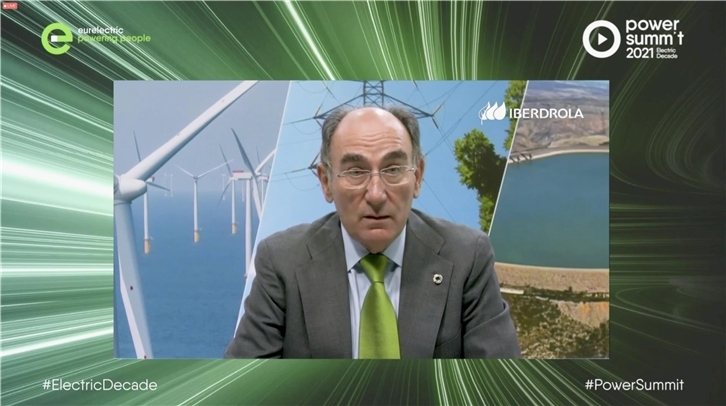
-
24/05/2021Cummins Selects Spain for its Gigawatt Electrolyzer Plant & Partners with Iberdrola to Lead the Green Hydrogen Value Chain Global power leader Cummins Inc. (NYSE: CMI) joined today government leaders and partner Iberdrola, one of the world’s largest energy companies, to announce its plans for one of the world’s largest electrolyzer plants for the production of green hydrogen to be located in Castilla-La Mancha, Spain. This investment in Spain comes on the heels of Iberdrola and Cummins’ decision to partner together on large-scale hydrogen production projects in Spain and Portugal. The companies have signed an agreement to accelerate the growth of business opportunities in the electrolyzer market of Iberia, promoting the green hydrogen value chain and making Spain a leader of this technology and industry. This alliance helps to position Cummins as a leading supplier of electrolyzer systems for large-scale projects in Iberia and Iberdrola as a leading developer of electrolyzer projects and hydrogen supplier to final industrial customers. “Spain offers a strong and dynamic local environment for hydrogen production, and we are excited to invest here and significantly increase our manufacturing capacity in Europe,” said Tom Linebarger, Chairman and CEO of Cummins. “Our partnership with Iberdrola will connect us with a major clean energy company and strategically positions us to be a European leader in green hydrogen production. We believe that this is just the start of our expansion into new markets, bringing new clean technology to customers, and supporting efforts to bring the European Union’s Green Deal to fruition. As communities move toward zero emissions, this is the latest example of Cummins’ global effort to achieve carbon neutrality and accelerate the hydrogen economy.” Ignacio Galán, Chairman and CEO of Iberdrola, said, “This initiative will accelerate the production of green hydrogen in Spain and will create a new industry, the manufacturing of electrolyzer systems, with high growth potential. We continue to make progress in our ambitious plan to put Spain and Europe at the global forefront of this technology by reducing energy dependence and fossil fuel consumption while driving the country's economic and social revitalization.” He added, “We congratulate ourselves on the choice to locate the project in a region that we value and in which we maintain a historic presence and commitment. This joint initiative will contribute to the economic, industrial and quality employment development in the region and will reinforce its great innovative commitment to a decisive technology for the decarbonization of the industry.” A site selection search within the Guadalajara area of Castilla-La Mancha is currently underway for Cummins’ new €50-million PEM electrolyzer plant that will house system assembly and testing for approximately 500 MW/year and will be scalable to more than 1 GW/year. The facility, which will initially be 22,000 square meters, is anticipated to open in 2023, creating 350 new jobs as production ramps up. Cummins is rapidly growing its capabilities to provide hydrogen technologies at scale, which is critical to the world’s green energy transition through the hydrogen economy. Cummins has deployed more than 600 electrolyzers in 100 countries globally. As part of this alliance, the 230-MW green hydrogen project in Palos de la Frontera (Huelva, Andalusia, Spain) - that Iberdrola has planned for the leading fertilizer producer Fertiberia - will become a benchmark for large electrolysis projects. Cummins will be the electrolyzer supplier for the Palos project and through the experience acquired in the project, Iberdrola and Cummins will jointly collaborate in the design of solutions for large electrolysis projects. Cummins and Iberdrola are also working on a hydrogen refueling station in Barcelona, Spain with additional partnership and broader co-operation opportunities anticipated in the future. Cummins’ ability to construct a state-of-the-art electrolyzer facility in Spain is a result of the strong support from the Castilla-La Mancha and Spanish governments. Additionally, with Spain’s support, this plant and partnership will accelerate the ability of green hydrogen to play a critical role in reducing greenhouse gas and air emissions from industrial industries to meet the goals in limiting global temperature increases laid out in the Paris Agreement and the European Union’s Green Deal, as well as help to deploy the Spanish and European hydrogen strategies. The plant will also enable Cummins to achieve carbon neutrality by 2050 as outlined in the company’s Planet 2050 sustainability strategy . Iberdrola has submitted 53 hydrogen-related projects to the Next Generation EU program, which would activate investments of €2.5 billion to achieve an annual production of 60,000 tn/year. The green hydrogen production capacity under this plan would be equivalent to 20% of the national target (4GW installed capacity by 2030) and would ensure that around 25% of the hydrogen currently consumed by Spain would not generate any CO2 emissions. This and related Iberdrola hydrogen projects are anticipated to fuel economic and job growth, contributing to the creation of approximately 4,000 skilled jobs across 500 local suppliers. In Castilla-La Mancha, Iberdrola operates 2,376 MW of renewable energy -wind power and photovoltaic-, which makes it the third autonomous community with the highest 'green' megawatts installed by Iberdrola in Spain. Recently, the company has completed three photovoltaic projects in the region, totaling 150 MW, and builds Puertollano photovoltaic plant (100 MW). READ MORE
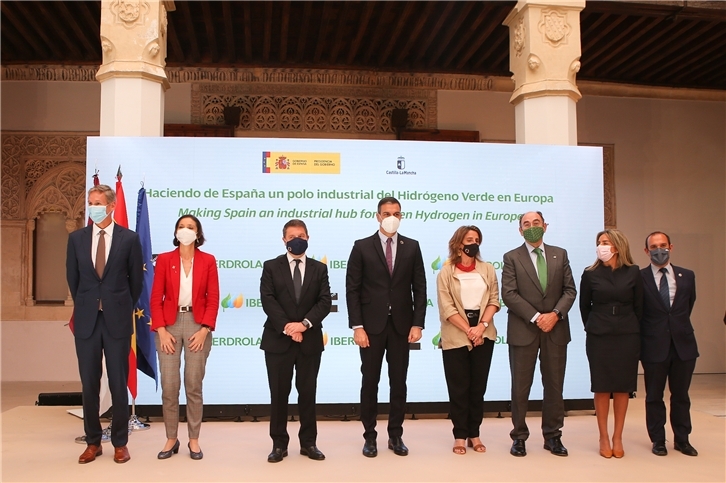
-
20/05/2021Iberdrola is awaiting approval for a 370 MW photovoltaic plant in Peralta, Navarre Iberdrola is continuing to develop renewable projects to generate clean, competitive energy through its application for approval for the Peralta photovoltaic plant (Navarre). The project has 370 megawatts (MW) of installed capacity, entails an investment of more than 200 million euros and has just been declared of Regional Interest. The company is planning to build the renewable production plant in the Peralta and Andosilla municipal areas. The project will also include several other infrastructure elements, including a 400 kV booster substation and a feeder line to the electricity distribution line between the towns of Funes, Milagro, Cadreita, Valtierra and Castejón. The photovoltaic project, which has been presented to the Ministry for Ecological Transition and Demographic Challenge, answers the need for a feeder line to the existing substations, thereby reducing its environmental impact. The construction of the Peralta photovoltaic plant will involve more than 1,200 workers, helping to boost the economy and jobs in sectors with a future. Once operational, the facilities will generate enough clean energy to supply the equivalent of 163,000 homes and avoid emissions of 76,800 tonnes of CO2/year. Developing clean energy and transforming the industrial sector In Navarre, the company operates the Cavar wind complex , with 111 MW of installed power, which involved 200 workers in its development and generated purchases from suppliers worth more than 80 million euros, many of them from local towns and neighbouring regions. Cavar produces enough clean energy to supply the equivalent of 46,500 households, preventing emission to the atmosphere of 84,000 t CO2/ year. Iberdrola is committed to the energy transition as an essential factor for transforming the industrial sector and the green recovery of the economy and employment in the regions. To achieve all this, the company has launched an unprecedented investment plan worth €75 bn for the 2020-2025 period, with the aim of doubling its renewable capacity and taking advantage of the opportunities presented by the energy revolution facing the world's main economies. Investments in Spain for the period amount to almost €14.3 bn, half of which (more than €7 bn), will be spent developing new renewable energy projects, while more than 4.5 bn will go towards strengthening and digitalising its electricity grids. After twenty years promoting the energy transition in Spain, Iberdrola leads in renewable energy in the country, with an installed renewable capacity exceeding 16,700 MW as of September 2020, an amount that totals more than 35,000 MW worldwide, making its generation facilities among the cleanest in the energy sector. With its emissions of 98 kg CO2/kWh already two-thirds lower than the European average, Iberdrola’s strategy of investing in clean energy and grids will lead Iberdrola to be a “carbon neutral” company in Europe by 2030. READ MORE
